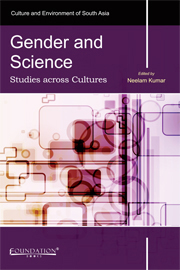Book contents
- Frontmatter
- Contents
- List of Contributors
- Acknowledgements
- Introduction: Reflections and Realities across Cultures
- Section I Approaches and Perspectives
- Section II Illustrative Examples
- 6 Women and Science in the Netherlands: A Dutch Case
- 7 Japanese Women Scientists: Trends and Strategies
- 8 Saudi Women: Their Role in Science and Education
- 9 Changing the Facts: Gender Dimensions of the South African Public Science System
- 10 Demographic Inertia and the Glass Ceiling in American Science (1979–2000)
- 11 Women in Science in France
- 12 Women and Science: Issues and Perspectives in the Indian Context
- Conclusion: The Persistent Patterns!
- Bibliography
- Index
9 - Changing the Facts: Gender Dimensions of the South African Public Science System
from Section II - Illustrative Examples
Published online by Cambridge University Press: 05 May 2013
- Frontmatter
- Contents
- List of Contributors
- Acknowledgements
- Introduction: Reflections and Realities across Cultures
- Section I Approaches and Perspectives
- Section II Illustrative Examples
- 6 Women and Science in the Netherlands: A Dutch Case
- 7 Japanese Women Scientists: Trends and Strategies
- 8 Saudi Women: Their Role in Science and Education
- 9 Changing the Facts: Gender Dimensions of the South African Public Science System
- 10 Demographic Inertia and the Glass Ceiling in American Science (1979–2000)
- 11 Women in Science in France
- 12 Women and Science: Issues and Perspectives in the Indian Context
- Conclusion: The Persistent Patterns!
- Bibliography
- Index
Summary
Economies need the talent of their entire population, male and female, to create a leading edge workforce …
Asia Pacific Economic Cooperation (APEC) 1998: p. 3Fifteen years after the ushering in of democracy in 1994, South Africa faces critical challenges for building a future economy and society which will sustain and develop its people. The decline of mining and resource-based industries over the past two decades, the challenges of global competitiveness for the manufacturing and services sectors, high unemployment and the need to address the causes of poverty have created increased demand for innovation in the private and public sectors. The increased global demand for science and technology inputs to key industries such as automotive manufacturing and pharmaceuticals, emerging sectors such as biodiversity, advanced materials, and ‘green’ industries, as well as social sciences and technology inputs to poverty reduction has created enormous and challenging opportunity for the South African research community. While increased levels of productive scientific activity can contribute to growth and development, this economic relationship requires a continuously growing scientific population, capable of creating and sustaining levels of innovation that will contribute to positive GDP per capita growth year after year. Furthermore, public policy must not simply encourage an increase in the number of women and men in the scientific population, but must aim to put the talent for scientific and technological innovation at the service of the poor.
- Type
- Chapter
- Information
- Gender and ScienceStudies across Cultures, pp. 185 - 207Publisher: Foundation BooksPrint publication year: 2012



